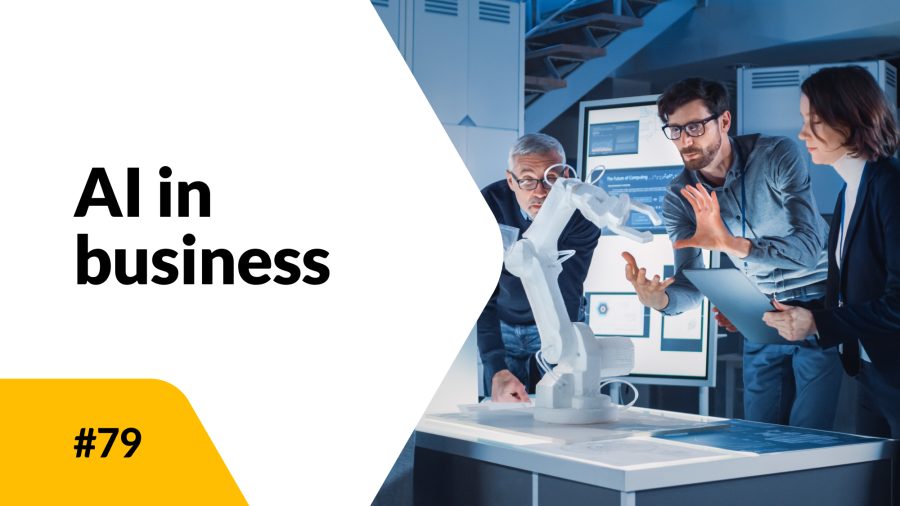Have you ever wondered about the impact of artificial intelligence on your journeys? Although you may not directly notice its presence in the tourism industry, you probably receive personalized recommendations for places to visit. Or perhaps you use chatbots to book a flight or hotel. The travel industry is undergoing a profound change thanks to artificial intelligence, and this is just the beginning, as both major and smaller travel companies are embracing these changes. Read on to find out more.
AI in the travel industry - table of contents:
How can the travel industry benefit from the implementation of AI?
AI opens up significant possibilities for the travel industry, allowing for cost optimization, enhanced customer service quality, and increased revenue. Here are some specific advantages:
- automation of back-office processes, such as handling bookings, for example. This saves time and reduces costs,
- analyzing customer preferences and behavior to personalize offers and recommendations, which increases the chances of purchase and loyalty of satisfied tourists,
- chatbots that streamline communication with customers, minimize frustrating wait times, and increase satisfaction while using the service,
- dynamic pricing systems based on demand and supply to maximize revenues.
As you can see, AI can support the tourism industry on many levels. Moreover, it helps in effectively managing seasonality and dealing with unpredictable events like the COVID-19 pandemic.

Source: DALL·E 3, prompt: Marta M. Kania (https://www.linkedin.com/in/martamatyldakania/)
Artificial intelligence in Airbnb
Airbnb uses artificial intelligence to recognize users’ interests, personalize search results, and enhance overall travel experiences.
One of the key projects at Airbnb in the field of AI is the LATEX system. It is used for extracting property attributes, such as amenities or views, from unstructured textual data. Based on this information, Airbnb creates personalized property recommendations tailored to the preferences of each guest.
Furthermore, the company has developed a proprietary system for categorizing photos of rental properties. Thanks to this system, it is possible, among other things, to automatically select the best cover photo for a given category, such as beach or mountain settings.
Airbnb is also intensively developing machine learning models to evaluate the quality and attractiveness of listings. These are later used in presenting search results. The higher the rating, the higher a listing is positioned.
Expedia – the most effective implementation of AI
Expedia is intensively implementing solutions using artificial intelligence in such areas as:
- predicting customer lifetime value (CLV),
- generating a variety of travel recommendations,
- optimization of ranking models.
Expedia’s machine learning (ML) systems can accurately estimate customer lifetime value or the total value of a customer’s transactions over time. This information is later used for marketing and customer service strategies.
The company is also constantly improving its recommendation algorithms. It is now using mechanisms to increase the variety of suggested trips so that every customer can find something suitable.
At Expedia, work is also underway to improve the models responsible for ranking listings in search results. Various methods are being tested, including those that enhance the diversity of presented hotels or flights.

Source: Investopedia (https://www.investopedia.com/)
Trivago and optimizing accommodation ratings
Trivago specializes in finding and comparing accommodation deals from more than 200 partner sites. The company’s main challenge is to properly rank the hundreds of thousands of available hotels, apartments, and lodgings so that the most relevant ones appear at the top of the results.
To this end, Trivago makes intensive use of machine learning models. Among other things, they use historical data on the popularity of a given accommodation and the preferences of guests with a similar profile.
However, to avoid presenting users only with the most popular and frequently chosen destinations, the company has implemented a special exploitation-exploration mechanism. Its purpose is to balance recommending proven, well-rated listings with exploring less-known ones in search of hidden gems.

Summary. The future of AI in the travel industry
Artificial intelligence is already permeating almost every aspect of the travel industry today. It supports both key business processes of companies and directly influences the experiences of travelers.
Experts predict that the role of AI will continue to grow in the coming years. New machine learning models will allow for an even better understanding of customer needs and the creation of personalized, unique experiences during trips.
But to achieve this, it will be necessary to strike a balance between digitalization and preserving the element of adventure and surprise that makes travel so special. Without a doubt, the future of tourism belongs to artificial intelligence.
If you like our content, join our busy bees community on Facebook, Twitter, LinkedIn, Instagram, YouTube, Pinterest, TikTok.
Author: Robert Whitney
JavaScript expert and instructor who coaches IT departments. His main goal is to up-level team productivity by teaching others how to effectively cooperate while coding.
AI in business:
- Threats and opportunities of AI in business (part 1)
- Threats and opportunities of AI in business (part 2)
- AI applications in business - overview
- AI-assisted text chatbots
- Business NLP today and tomorrow
- The role of AI in business decision-making
- Scheduling social media posts. How can AI help?
- Automated social media posts
- New services and products operating with AI
- What are the weaknesses of my business idea? A brainstorming session with ChatGPT
- Using ChatGPT in business
- Synthetic actors. Top 3 AI video generators
- 3 useful AI graphic design tools. Generative AI in business
- 3 awesome AI writers you must try out today
- Exploring the power of AI in music creation
- Navigating new business opportunities with ChatGPT-4
- AI tools for the manager
- 6 awesome ChatGTP plugins that will make your life easier
- 3 grafików AI. Generatywna sztuczna inteligencja dla biznesu
- What is the future of AI according to McKinsey Global Institute?
- Artificial intelligence in business - Introduction
- What is NLP, or natural language processing in business
- Automatic document processing
- Google Translate vs DeepL. 5 applications of machine translation for business
- The operation and business applications of voicebots
- Virtual assistant technology, or how to talk to AI?
- What is Business Intelligence?
- Will artificial intelligence replace business analysts?
- How can artificial intelligence help with BPM?
- AI and social media – what do they say about us?
- Artificial intelligence in content management
- Creative AI of today and tomorrow
- Multimodal AI and its applications in business
- New interactions. How is AI changing the way we operate devices?
- RPA and APIs in a digital company
- The future job market and upcoming professions
- AI in EdTech. 3 examples of companies that used the potential of artificial intelligence
- Artificial intelligence and the environment. 3 AI solutions to help you build a sustainable business
- AI content detectors. Are they worth it?
- ChatGPT vs Bard vs Bing. Which AI chatbot is leading the race?
- Is chatbot AI a competitor to Google search?
- Effective ChatGPT Prompts for HR and Recruitment
- Prompt engineering. What does a prompt engineer do?
- AI Mockup generator. Top 4 tools
- AI and what else? Top technology trends for business in 2024
- AI and business ethics. Why you should invest in ethical solutions
- Meta AI. What should you know about Facebook and Instagram's AI-supported features?
- AI regulation. What do you need to know as an entrepreneur?
- 5 new uses of AI in business
- AI products and projects - how are they different from others?
- AI-assisted process automation. Where to start?
- How do you match an AI solution to a business problem?
- AI as an expert on your team
- AI team vs. division of roles
- How to choose a career field in AI?
- Is it always worth it to add artificial intelligence to the product development process?
- AI in HR: How recruitment automation affects HR and team development
- 6 most interesting AI tools in 2023
- 6 biggest business mishaps caused by AI
- What is the company's AI maturity analysis?
- AI for B2B personalization
- ChatGPT use cases. 18 examples of how to improve your business with ChatGPT in 2024
- Microlearning. A quick way to get new skills
- The most interesting AI implementations in companies in 2024
- What do artificial intelligence specialists do?
- What challenges does the AI project bring?
- Top 8 AI tools for business in 2024
- AI in CRM. What does AI change in CRM tools?
- The UE AI Act. How does Europe regulate the use of artificial intelligence
- Sora. How will realistic videos from OpenAI change business?
- Top 7 AI website builders
- No-code tools and AI innovations
- How much does using AI increase the productivity of your team?
- How to use ChatGTP for market research?
- How to broaden the reach of your AI marketing campaign?
- "We are all developers". How can citizen developers help your company?
- AI in transportation and logistics
- What business pain points can AI fix?
- Artificial intelligence in the media
- AI in banking and finance. Stripe, Monzo, and Grab
- AI in the travel industry
- How AI is fostering the birth of new technologies
- The revolution of AI in social media
- AI in e-commerce. Overview of global leaders
- Top 4 AI image creation tools
- Top 5 AI tools for data analysis
- AI strategy in your company - how to build it?
- Best AI courses – 6 awesome recommendations
- Optimizing social media listening with AI tools
- IoT + AI, or how to reduce energy costs in a company
- AI in logistics. 5 best tools
- GPT Store – an overview of the most interesting GPTs for business
- LLM, GPT, RAG... What do AI acronyms mean?
- AI robots – the future or present of business?
- What is the cost of implementing AI in a company?
- How can AI help in a freelancer’s career?
- Automating work and increasing productivity. A guide to AI for freelancers
- AI for startups – best tools
- Building a website with AI
- OpenAI, Midjourney, Anthropic, Hugging Face. Who is who in the world of AI?
- Eleven Labs and what else? The most promising AI startups
- Synthetic data and its importance for the development of your business
- Top AI search engines. Where to look for AI tools?
- Video AI. The latest AI video generators
- AI for managers. How AI can make your job easier
- What’s new in Google Gemini? Everything you need to know
- AI in Poland. Companies, meetings, and conferences
- AI calendar. How to optimize your time in a company?
- AI and the future of work. How to prepare your business for change?
- AI voice cloning for business. How to create personalized voice messages with AI?
- Fact-checking and AI hallucinations
- AI in recruitment – developing recruitment materials step-by-step
- Midjourney v6. Innovations in AI image generation
- AI in SMEs. How can SMEs compete with giants using AI?
- How is AI changing influencer marketing?
- Is AI really a threat to developers? Devin and Microsoft AutoDev
- AI chatbots for e-commerce. Case studies
- Best AI chatbots for ecommerce. Platforms
- How to stay on top of what's going on in the AI world?
- Taming AI. How to take the first steps to apply AI in your business?
- Perplexity, Bing Copilot, or You.com? Comparing AI search engines
- ReALM. A groundbreaking language model from Apple?
- AI experts in Poland
- Google Genie — a generative AI model that creates fully interactive worlds from images
- Automation or augmentation? Two approaches to AI in a company
- LLMOps, or how to effectively manage language models in an organization
- AI video generation. New horizons in video content production for businesses
- Best AI transcription tools. How to transform long recordings into concise summaries?
- Sentiment analysis with AI. How does it help drive change in business?
- The role of AI in content moderation


















